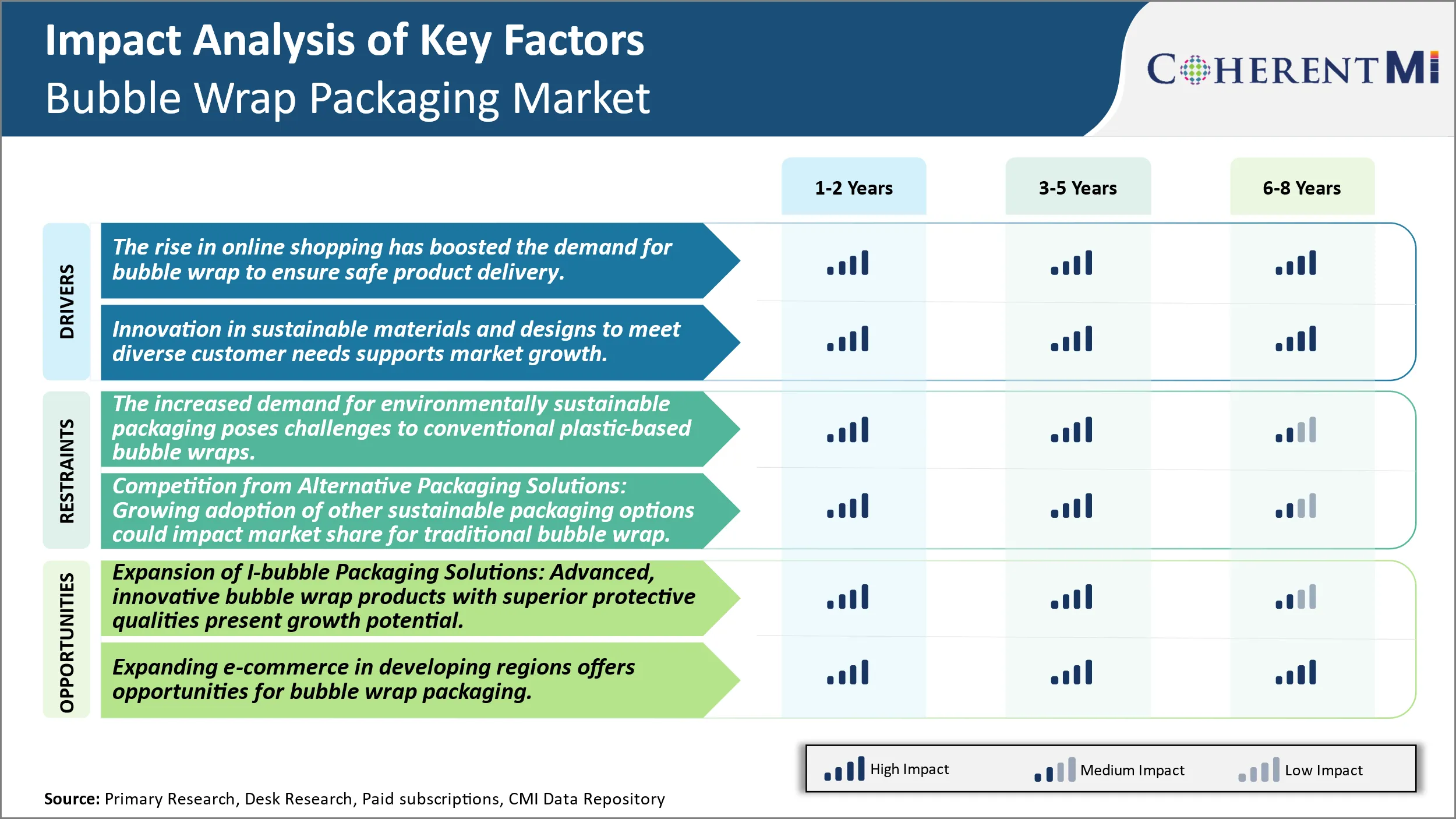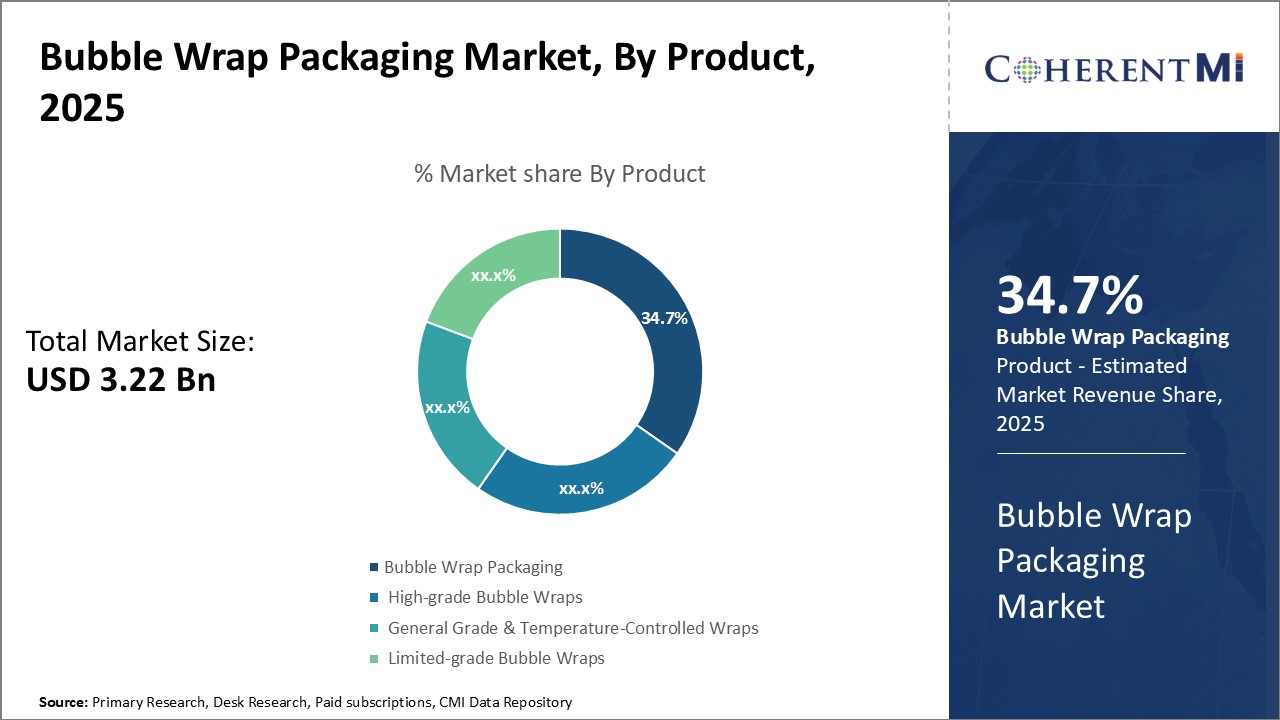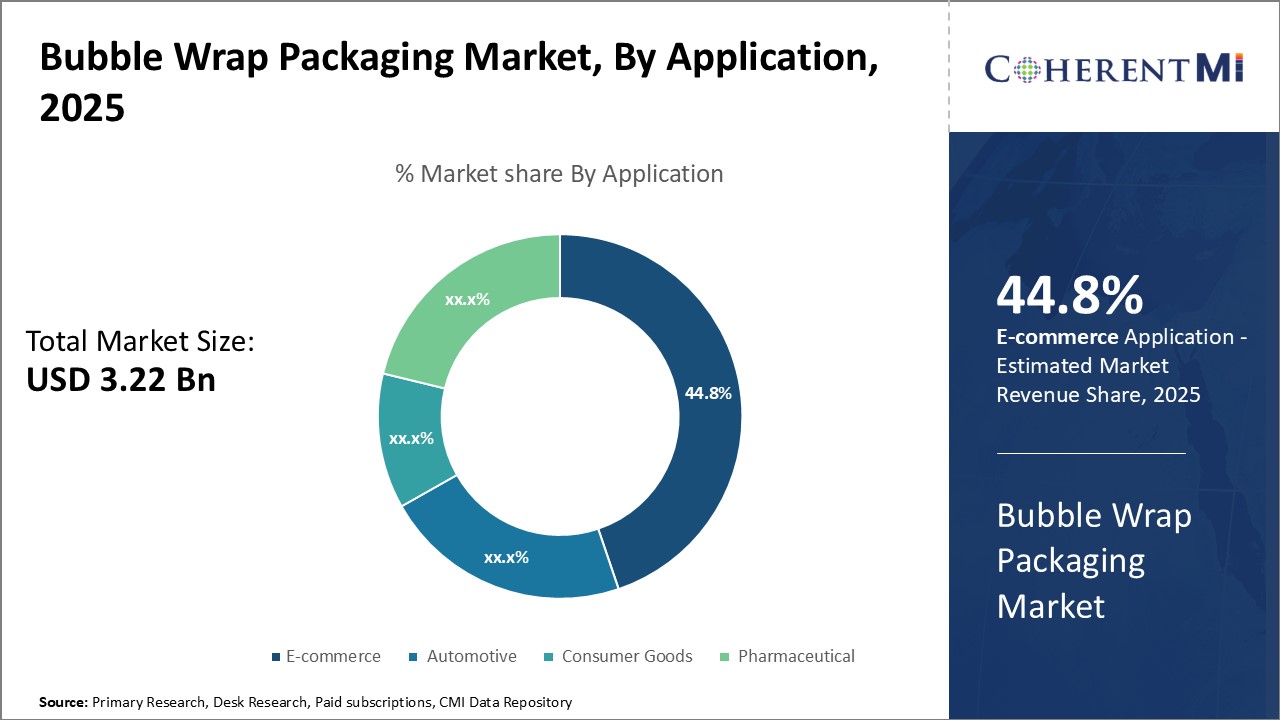Bubble Wrap Packaging Market Size - Analysis
Market Size in USD Bn
CAGR3.7%
| Study Period | 2025-2032 |
| Base Year of Estimation | 2024 |
| CAGR | 3.7% |
| Market Concentration | High |
| Major Players | Sealed Air Inc., Pregis Inc., Jiffy Packaging Co., Smurfit Kappa PLC, Veritiv Corporation and Among Others |
please let us know !
Bubble Wrap Packaging Market Trends
The rise of online shopping in the past decade has been one of the defining trends across major economies worldwide. As customers increasingly choose the convenience of shopping from the comfort of their homes, the need to deliver products safely to their doorsteps has assumed greater importance. This is where bubble wrap plays a crucial protective role. Whether it be appliances, furniture, home décor items, electronics or any other product that needs to be shipped, bubble wrap is widely used as the packing material of choice by both retailers and logistics companies.
The boost in e-commerce penetration driven by rising internet and smartphone adoption has majorly contributed to increased bubble wrap consumption. Whether within urban areas through mobile apps or in remote locales through web interfaces, online shopping portals have proliferated across regions. The 'try-it-at-home' model replacing showroom visits has expanded the market for various goods that now need protection packaging. Even traditional brick-and-mortar chains are augmenting their presence through their own websites and marketplaces to cater to evolving consumer preferences for digital browsing and purchasing. All of these dynamics are expected to sustain the upward bubble wrap demand trend in support of safe product deliveries.
Market Driver - Technological Advances in Bubble Wrap Materials Boosts Industry Development
The growth of fragile and high-value product categories has driven interest in enhanced performance bubble wraps. Options with extra strong seals, moisture-proof barriers and anti-static properties for electronics are available. Bubble patterns are customized using digital printing to add visual appeal for promotional use as well gift wraps. Dual-layer wraps with extra sturdy internal screens allow reuse of the material multiple times, supporting cost-efficiency. Even automated packaging machinery integrates specialized film dispensers and sealers for precision and speed.

Market Challenge - The Increased Demand for Environmentally Sustainable Packaging Poses Challenges to Conventional Plastic-Based Bubble Wraps
The rising market challenges from environmental sustainability have created new opportunities for growth through innovative packaging solutions. Companies developing advanced bubble wrap products made of renewable and recyclable materials like paper and plant-based films are poised for expansion. In particular, ‘i-bubble’ technology which uses bubble-forming air columns trapped between two sheets without using plastic film has emerged as a breakthrough sustainable packaging format. I-bubble wraps offer cushioning performance comparable to conventional plastic variants while eliminating the usage of single-use plastics. Their recyclable paper-based construction aligns well with the increasing eco-consciousness among both businesses and consumers. As companies continue to improve i-bubble production processes and offerings, their superior protective qualities and sustainable attributes are likely to appeal to a wide range of industries, driving higher market acceptability and demand. With strategic investments in R&D and manufacturing scale-up, i-bubble solution providers stand to capture a major share of the rapidly evolving bubble wrap packaging market.
Key winning strategies adopted by key players of Bubble Wrap Packaging Market
- Sustainability Initiatives: Manufacturers are developing eco-friendly alternatives to traditional plastic bubble wrap, such as biodegradable and recyclable materials, to meet the growing demand for sustainable packaging solutions.
- Technological Advancements: Investing in innovative technologies, including the production of anti-static bubble wraps for electronics and temperature-controlled variants for perishable goods, allows companies to cater to diverse industry needs.
- Customization and Personalization: Offering tailored packaging solutions, such as custom-sized bubble wraps and branded designs, helps businesses meet specific client requirements and enhance brand recognition.
- E-commerce Integration: Aligning packaging solutions with the e-commerce sector's needs by optimizing bubble wrap for efficient shipping and enhancing the unboxing experience contributes to customer satisfaction and loyalty.
- Strategic Partnerships and Acquisitions: Collaborating with or acquiring companies that provide complementary products or technologies enables businesses to expand their product portfolios and market reach.
- Geographical Expansion: Entering emerging markets, particularly in regions like Asia-Pacific, allows companies to tap into new customer bases and capitalize on the growing demand for protective packaging.
Segmental Analysis of Bubble Wrap Packaging Market
 Insights, By Product, Bubble Wrap Packaging Leads the Market Share in 2024
Insights, By Product, Bubble Wrap Packaging Leads the Market Share in 2024By Product, Bubble Wrap Packaging contributes 34.7% market share in 2025 owing to its versatility and cost-effectiveness. Bubble wrap packaging remains the most widely used product in the bubble wrap packaging market due to its excellent cushioning and insulation properties. Bubble wrap features small air-filled bubbles that provide protective padding without using excessive materials. This makes it much more affordable than alternatives like foam or expanded polystyrene.
Furthermore, bubble wrap is highly reusable which improves its value proposition. Individual bubbles rarely puncture, so a single sheet can protect multiple packages over multiple uses. This extends the lifespan of bubble wrap and reduces costs per use compared to single-use plastic films. It has become especially popular with online merchants and small businesses who want affordable, reliable packaging.

Insights, By Application, E-commerce drives highest demand in the Bubble Wrap Packaging market
Additionally, bubble wrap creates a protective barrier without obscuring brand images or labels like air pillows can. This allows companies to showcase their products attractively right up until delivery. Strong packaging builds customer confidence in product condition and return/refund policies for online purchases. Reliable packaging becomes even more important for fragile or perishable goods sold online. Bubble wrap outperforms other materials at insulating temperature fluctuations during travel. Its moisture-resistant and breathable properties help maintain quality of items like food, electronics and medical supplies. Accordingly, e-commerce businesses have come to rely on bubble wrap as a cost-effective way to guarantee customer satisfaction with each order. This drives consistent high demand that keeps bubble wrap the top-selling product in the market.
Additional Insights of Bubble Wrap Packaging Market
The bubble wrap packaging market is growing as online shopping becomes more popular, particularly in the Asia Pacific and North America. As e-commerce demands increased packaging for fragile items, bubble wrap has become essential for safe delivery. Technological advancements have led to eco-friendly bubble wrap options, like I-bubble wraps, which are sustainable and efficient for the changing retail landscape. While conventional bubble wrap packaging faces environmental challenges, innovations in materials and manufacturing support its market expansion. The retail industry's expansion, especially in emerging economies, further boosts demand. Key players are adapting to regulatory pressures by developing recyclable or biodegradable options, positioning bubble wrap as an adaptable packaging choice for diverse industries.
Competitive overview of Bubble Wrap Packaging Market
The major players operating in the Bubble Wrap Packaging Market include Sealed Air Inc., Pregis Inc., Jiffy Packaging Co., Smurfit Kappa PLC, Veritiv Corporation, Barton Jones Packaging Ltd., IVEX Protective Packaging Inc., Automated Packaging System Inc., Storopack Hans Reichenecker GmbH and Vereinigte Papierwarenfabriken GmbH.
Bubble Wrap Packaging Market Leaders
- Sealed Air Inc.
- Pregis Inc.
- Jiffy Packaging Co.
- Smurfit Kappa PLC
- Veritiv Corporation
Bubble Wrap Packaging Market - Competitive Rivalry

Bubble Wrap Packaging Market
(Dominated by major players)
(Highly competitive with lots of players.)
Bubble Wrap Packaging Market Segmentation
- By Product
- Bubble Wrap Packaging
- High-grade Bubble Wraps
- General Grade & Temperature-Controlled Wraps
- Limited-grade Bubble Wraps
- By Application
- E-commerce
- Automotive
- Consumer Goods
- Pharmaceutical

Would you like to explore the option of buying individual sections of this report?
Kalpesh Gharte is a senior consultant with approximately 5 years of experience in the consulting industry. Kalpesh holds an MBA in Operations and Marketing Management, providing him with a strong foundation in market strategy and analysis. He has contributed to various consulting and syndicated reports, delivering valuable insights that support informed business decisions
Frequently Asked Questions :
How Big is the Bubble Wrap Packaging Market?
The Global Bubble Wrap Packaging Market is estimated to be valued at USD 3.22 Bn in 2025 and is expected to reach USD 4.15 Bn by 2032.
What will be the CAGR of the Bubble Wrap Packaging Market?
The CAGR of the Bubble Wrap Packaging Market is projected to be 3.5% from 2024 to 2031.
What are the major factors driving the Bubble Wrap Packaging Market growth?
The growth in retail and e-commerce sectors, the rise in online shopping has boosted the demand for bubble wrap to ensure safe product delivery. Innovation in sustainable materials and designs to meet diverse customer needs, supports market growth. These are the major factors driving the Bubble Wrap Packaging Market.
What are the key factors hampering the growth of the Bubble Wrap Packaging Market?
The increased demand for environmentally sustainable packaging poses challenges to conventional plastic-based bubble wraps and competition from alternative packaging solutions, growing adoption of other sustainable packaging options could impact market share for traditional bubble wrap are the major factors hampering the growth of the Bubble Wrap Packaging Market.
Which is the leading Product in the Bubble Wrap Packaging Market?
The leading Product segment is Bubble Wrap Packaging.
Which are the major players operating in the Bubble Wrap Packaging Market?
Sealed Air Inc., Pregis Inc., Jiffy Packaging Co. Smurfit Kappa PLC, Veritiv Corporation, Barton Jones Packaging Ltd., IVEX Protective Packaging Inc., Automated Packaging System Inc., Storopack Hans Reichenecker GmbH, Vereinigte Papierwarenfabriken GmbH are the major players.